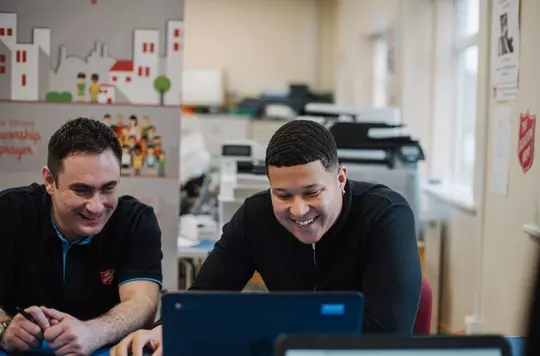8 February 2025
'Apprenticeships are about more than work'
George Tanton

Kate Burke speaks to George Tanton about how apprenticeships provide opportunities to all sorts of people.
In 1891, The Salvation Army acquired Hadleigh Farm for the purpose of providing vocational training to unskilled labourers in need of work. Today, the Army provides apprenticeships to a wide variety of people in a range of industries.
Apprenticeship Development Manager Kate Burke explains the impact they are having:
How would you describe an apprenticeship?
Apprenticeships are work-based training programmes often delivered in partnership with colleges, national training providers and universities. We use them to nurture our workforce and generate roles to fulfil operational needs for vital frontline work in community outreach, health and social care, and employment services.
We also offer them in management and leadership, youth work and early years, hospitality, business administration, finance and fundraising.
How do apprenticeships differ from Employment Plus?
Employment Plus offers a much-needed service, tailored to support individuals become job-ready, by providing advice for CV writing and interview techniques as well as life skills.
Apprenticeships are available to those already in employment and are funded by the government’s apprenticeship levy.
Why is it important to nurture people’s careers through apprenticeships?
It’s crucial for enhancing their skills and boosting job satisfaction, as well as ensuring The Salvation Army as an organisation remains competitive. When staff members are invested in, they are more likely to stay.
Apprenticeships allow them to stay current with industry trends and best practices, while improving their performance in their roles.
Upskilling people through apprenticeships also serves to directly enhance the quality of Salvation Army services, creating a positive, long-lasting impact on the communities and individuals we support.
Historically, apprenticeships with the Army have helped people from deprived socio-economic backgrounds. Is this still the case, and who else do they help?
Traditionally, apprenticeships were associated with younger people entering manual and vocational trades. They continue to be a vital tool for individuals from disadvantaged or low-income backgrounds.
They offer opportunities to gain skills and qualifications without the need for expensive formal education – this helps break the cycle of inequality and provide a route to stable employment.
However, today they are versatile and flexible, open to all ages and levels of experience. They are increasingly accessible to a broader range of individuals, supporting a variety of people in different circumstances.
They are particularly valuable to young people who may not want to pursue a traditional academic route but who are eager to build a career. Apprenticeships allow for them to earn while they learn, making them financially self-sufficient.
Equally, apprenticeships are for people looking to change careers later in life, or for individuals wanting to switch industries or upskill in their current field.
How do apprenticeships tie in with the Army’s mission priorities and values?
At The Salvation Army, apprenticeships are about more than work; they’re about building a brighter future for all, fostering hope, and living out the gospel message of love and service. Jesus did this by actively involving his disciples in the work he was doing, guiding them through example, instruction and hands-on experience.
Apprenticeships help the Army to create a more inclusive workforce, providing opportunities to people from diverse backgrounds and helping women thrive in traditionally male-dominated industries.
The Army also offers apprenticeships to individuals with disabilities and health-related challenges, tailoring learning opportunities and working arrangements to meet their needs and making the workforce accessible to them.
Our apprenticeships foster compassion, treating apprentices with dignity and valuing their contributions to our work.
Interview by

George Tanton
Editorial Assistant
Discover more

From jobs in corps and headquarters to opportunities in teams responding to key social issues.

London and South East divisional apprentices share how they are developing through work-based training.

